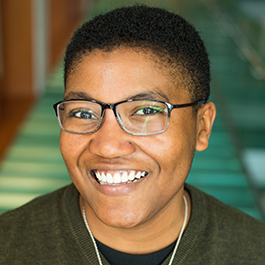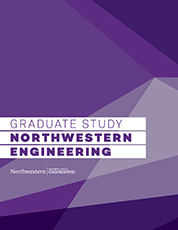Deliberative Design Brings Biases to the Forefront
Kristen Smith (EDI '20) reflects on their thesis project for Northwestern's Engineering Design Innovation (EDI) program and how they are looking to reinvent the problem-solving process.
 I've worked inside and outside of academia, and through those experiences I've uncovered a common trend. When most people are asked to solve a problem, they often follow a predictable four-step process.
I've worked inside and outside of academia, and through those experiences I've uncovered a common trend. When most people are asked to solve a problem, they often follow a predictable four-step process.
- Definition: Articulate the problem
- Discovery: Research the ins and outs of the problem they're trying to solve through interviews, market research, and other methods
- Development: Turn the research into a collection of possible solutions
- Delivery: Share a prototype of the solution with others for feedback, or release the final version into the world
I've followed this process, but have recently realized that it's flawed. None of these steps ask the problem-solver to reflect on how they feel about the project. Engineers and designers — or every professional that solves problems — are human beings before all else. We all have our own opinions about how the world functions, and it is naive to assume those opinions vanish when work starts.
For my thesis project in Northwestern's Engineering Design Innovation (EDI) program, I attempted to solve this problem by creating Deliberative Design, a framework that helps designers and engineers reflect on who they are as people and acknowledge the impact their experiences and biases have on their work, and do so in a repeatable way. My thesis mentor, Avani Agarwal, talked with me about her work as a UX partnerships lead and material design advocate at Google, as well as her experience founding STATURE, an online clothing store geared for women with smaller frames. Her guidance helped me understand how to articulate my project.
Bias is truly inextricable from the creative and professional process. Professionals, students, and makers of all kinds have experienced a project in which they are unable to separate work life from personal life. I’ve found myself in a number of these situations in my lifetime, and having to compartmentalize your beliefs is both emotionally draining and wholly unsustainable.
This led me to wonder about bias in design ethics. A former professor who is now a friend posed a question to my classmates in one of our first EDI classes: What would it look like if there were a governing body to define design ethics, much like there is for lawyers, engineers, and doctors? That question pulled into focus one of my personal passions, which is figuring out how all of the societal “-isms” (e.g. racism, ageism, heterosexism, ableism, etc.) worm their way into industries and negatively affect people’s everyday lives.
I did research and had a lot of questions, so I interviewed my personal and professional network to help make sense of it all. Within that group, those who have experienced societal oppression responded to my questions of separating work and life with something like, “I have to think about people having bias against me every day and have to compartmentalize it to survive. Doing that for work is hard, but I’m used to it.”
To even the playing field, I thought there should be a specific step in the problem-solving process called “Deliberation,” where everyone sits and reflects before they work. However, I realized that personal beliefs impact every part of the process:
- Definition: what you believe is possible, and who you think should be helped
- Discovery: where you source your research, whom you interview, what you take away from what they say
- Development: which ideas get turned into solutions
- Delivery: how you frame your product, to whom you sell the product, who makes money
Since bias appears everywhere in the process, the “Deliberation” step, and ultimately my Deliberative Design framework (and corresponding app), could reasonably be sprinkled throughout the process. In my ideal world, it’d be common to say to your teammates, “I think this is the right idea, but in full transparency, that’s based on my personal experience and not directly on what the interviewees said.” I hope Deliberative Design is a step in that direction.
I graduated in December and am now back in the workforce as an integrated product design engineer at Procter & Gamble, but I can’t put my thesis work away. Today, when I mention my thesis to someone, they routinely ask if I can speak to their staff or their students. I think we’re on the brink of collectively realizing that science, technology, math, and engineering are not purely objective -- that is, practitioners of these fields have assumptions that influence what questions they ask and what features they prioritize. Getting society to think more about subjective nuance in "objective" fields is important to me.
I want makers to think critically about what design choices they’re making and why. I want design programs to prepare their students for bias cropping up before they enter the workforce. I want scientists to talk openly about which biases underlie scientific facts. We need technologists to ask tough questions of themselves and be allowed to share the answers.
I'm happy that my thesis work is bringing light to some of these questions.
This post is part of a series of stories that examines EDI thesis projects.

